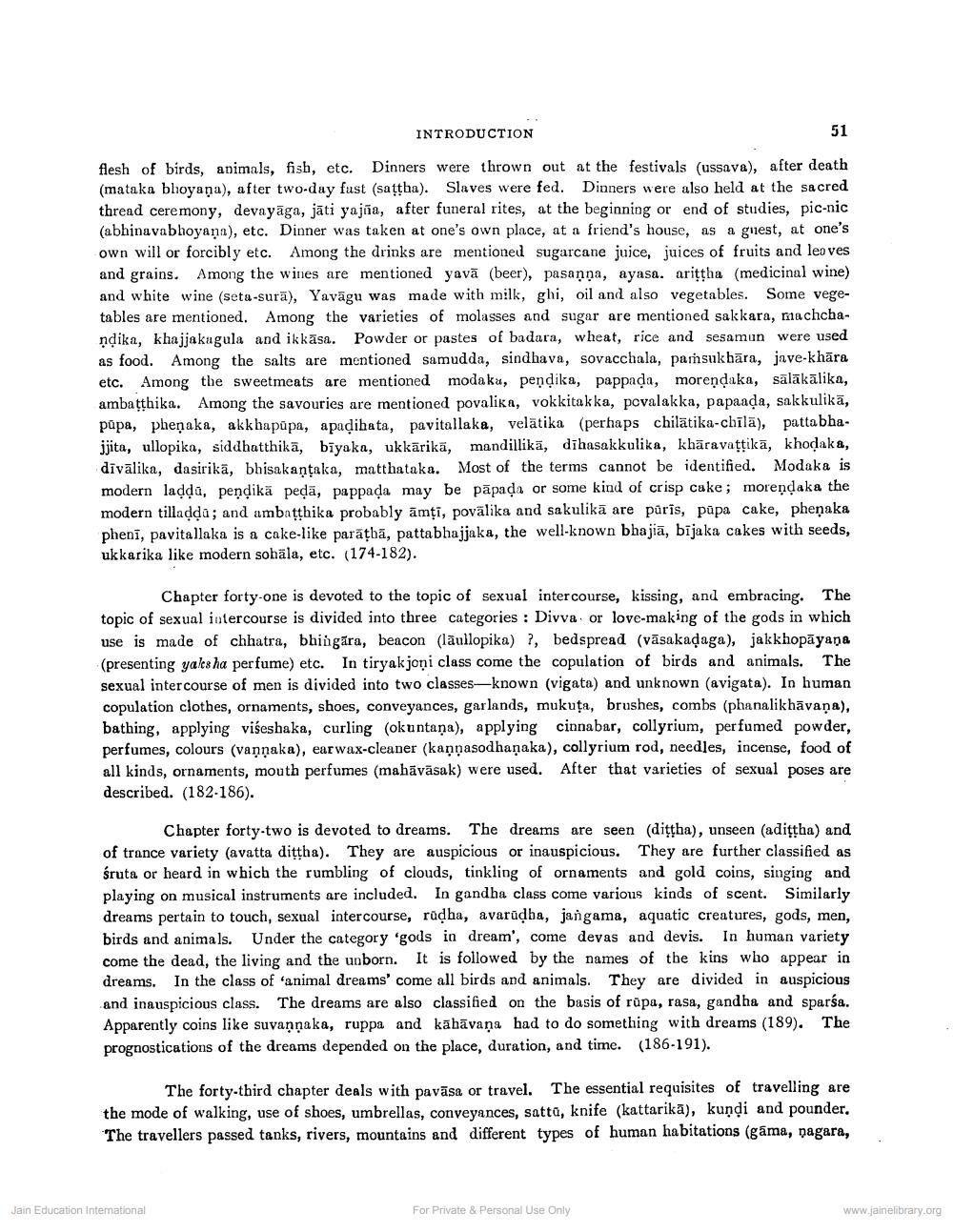________________
INTRODUCTION
51
flesh of birds, animals, fish, etc. Dinners were thrown out at the festivals (ussava), after death (mataka bloyana), after two-day fust (saţtha). Slaves were fed. Dinners were also held at the sacred thread ceremony, devayāga, jāti yajña, after funeral rites, at the beginning or end of studies, pic-nic (abhinavabhoyaņa), etc. Dinner was taken at one's own place, at a friend's house, as a guest, at one's own will or forcibly etc. Among the drinks are mentioned sugarcane juice, juices of fruits and leaves and grains. Among the wines are mentioned yavā (beer), pasanna, ayasa. arittha (medicinal wine) and white wine (seta-sura), Yavāgu was made with milk, ghi, oil and also vegetables. Some vegetables are mentioned. Among the varieties of molasses and sugar are mentioned sakkara, machchandika, khajjakugula and ikkäsa. Powder or pastes of badara, wheat, rice and sesamun were used as food. Among the salts are mentioned samudda, sindhava, sovacchala, parisukhāra, jave-khāra etc. Among the sweetmeats are mentioned modaka, pendika, pappada, morendaka, sālākālika, ambatthika. Among the savouries are mentioned povalika, vokkitak ka, povalakka, papaada, sakkulikā, pūpa, phenaka, akkhapūpa, apadihata, pavitallaka, velatika (perhaps chilātika-chila), pattabhajjita, ullopika, siddhatthikā, bīyaka, ukkārikā, mandillikā, dihasakkulika, khāravațţikā, khodaka, divālika, dasirikā, bhisakantaka, matthataka. Most of the terms cannot be identified. Modaka is modern ladda, pendikā peļā, pappada may be pāpada or some kind of crisp cake; moreņdaka the modern tilladda; and ambatthika probably amţi, povālika and sakulikā are pūris, papa cake, phenaka phenī, pavitallaka is a cake-like paratha, pattabhajjaka, the well-known bhajia, bija ka cakes with seeds, uk karika like modern sohala, etc. (174-182).
Chapter forty-one is devoted to the topic of sexual intercourse, kissing, and embracing. The topic of sexual intercourse is divided into three categories : Divva or love-making of the gods in which use is made of chhatra, bhingāra, beacon (laullopika) ?, bedspread (vāsakadaga), jakkhopāyana (presenting yales ha perfume) etc. In tiryakjoņi class come the copulation of birds and animals. The sexual intercourse of men is divided into two classes—known (vigata) and unknown (avigata). In human copulation clothes, ornaments, shoes, conveyances, garlands, mukuta, brushes, combs (phanalikhāvana), bathing, applying việeshaka, curling (okuntaņa), applying cinnabar, collyrium, perfumed powder, Perfumes, colours (vaņņaka), earwax-cleaner (kaņpasodhaņaka), collyrium rod, needles, incense, food of all kinds, ornaments, mouth perfumes (mahāvāsak) were used. After that varieties of sexual poses are described. (182-186).
Chapter forty-two is devoted to dreams. The dreams are seen (dittha), unseen (aditha) and of trance variety (avatta dittha). They are auspicious or inauspicious. They are further classified as śruta or heard in which the rumbling of clouds, tinkling of ornaments and gold coins, singing and playing on musical instruments are included. In gandha class come various kinds of scent. Similarly dreams pertain to touch, sexual intercourse, rūdha, avarūdba, jangama, aquatic creatures, gods, men, birds and animals. Under the category 'gods in dream', come devas and devis. In human variety come the dead, the living and the unborn. It is followed by the names of the kins who appear in dreams. In the class of animal dreams come all birds and animals. They are divided in auspicious and inauspicious class. The dreams are also classified on the basis of rupa, rasa, gandha and sparsa. Apparently coins like suvannaka, ruppa and kābāvana had to do something with dreams (189). The prognostications of the dreams depended on the place, duration, and time. (186-191).
The forty-third chapter deals with pavāsa or travel. The essential requisites of travelling are the mode of walking, use of shoes, umbrellas, conveyances, satta, knife (kattarika), kundi and pounder, The travellers passed tanks, rivers, mountains and different types of human habitations (gama, pagara,
Jain Education International
For Private & Personal Use Only
www.jainelibrary.org




